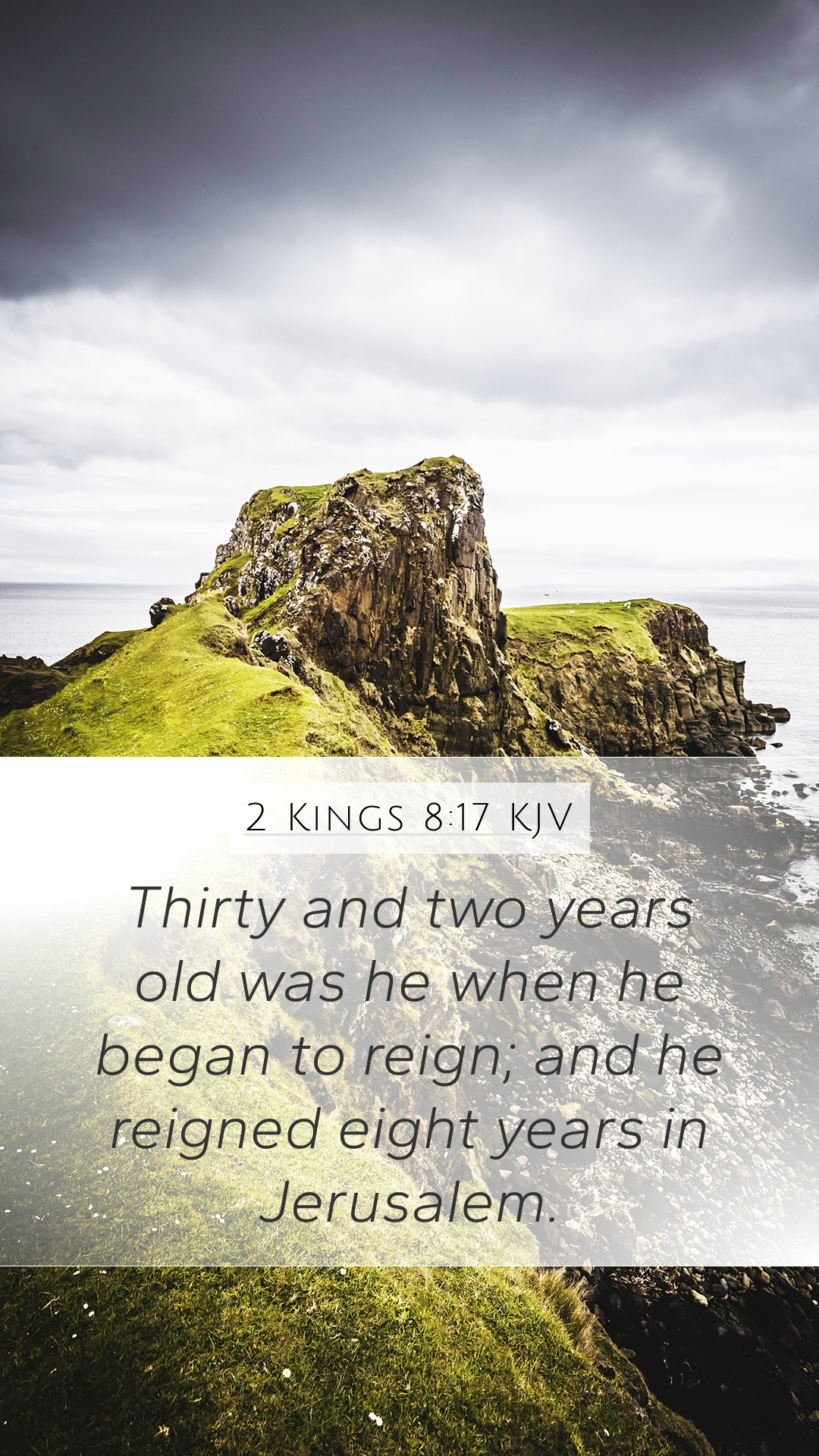Understanding 2 Kings 8:17: A Commentary
Verse: "In the fifth year of Joram the son of Ahab king of Israel, Jehoshaphat being then king of Judah, Jehoram the son of Jehoshaphat king of Judah began to reign." (2 Kings 8:17)
Overview: This Bible verse marks a significant point in the narrative of the kings of Judah and Israel. It introduces the reign of Jehoram, shedding light on the political landscape during a tumultuous era in Israel's history.
Key Themes and Insights
- Historical Context: This verse situates Jehoram of Judah's reign within the broader context of Israel's monarchy, specifically during the reign of Joram of Israel and Jehoshaphat of Judah. This alignment interlinks their stories and highlights the complexities of their rule.
- Legacy of Kings: The mention of lineage (Jehoram being the son of Jehoshaphat) serves to emphasize the divine order and continuation of leadership, as God maintains a lineage through which He conducts His will.
- Political Turbulence: The time frame indicates the connection of the two kings' reigns. Joram of Israel was known for his wickedness, a reflection of the spiritual decay during that period.
- Relation to Prophetic Insight: This verse connects to the prophetic writings and fulfillments that demonstrate God's sovereignty despite human actions. Prophets like Elisha reveal God's ongoing plan amidst the chaos of human governance.
- Application to Life: Understanding the leadership styles and moral choices of these kings provides insights into the importance of integrity in governance and personal leadership in our lives today.
Commentary Insights
Matthew Henry's Commentary: Henry emphasizes that Jehoram of Judah began his reign with considerable influence but faced challenges due to the existing goodwill that Jehoshaphat had garnered. His insights highlight the moral responsibilities of leaders and the consequences of their actions.
Albert Barnes' Notes: Barnes discusses the significance of the timing of Jehoram's reign in relation to Israel's kingship. The intertwining of their reigns exemplifies God's control amidst the shifting political loyalties and the deep-seated issues arising from idolatry and sin.
Adam Clarke's Commentary: Clarke notes the emphasis on the relationship between Jehoram and his father, illustrating the responsibilities inherited by kings. He also touches on the ramifications of the previous kings’ actions, setting the stage for future conflicts and divine judgments.
In-depth Analysis
This verse serves as an introduction to a complex period characterized by a succession of kings who often led the people away from God's commands. The duality of the leadership between Israel and Judah reflects the spiritual and moral dichotomy of the time with norms rooted in covenant faithfulness.
Bible Study Applications
- Engage in Bible study: Encourage group discussions around this verse in the context of leadership ethics, exploring how historical ties influence our current understanding of authority.
- Reflect on personal governance: Consider how this ancient context can inform modern leadership, be it in personal life, community, or professional arenas.
Cross References
- 1 Kings 22:50 - The transition from Jehoshaphat to Jehoram
- 2 Kings 3:1-3 - The further background on Jehoram’s reign
- 2 Chronicles 21:5-6 - Insights into Jehoram’s character and decisions
Conclusion
In exploring 2 Kings 8:17, we gain insights into the meaning of its historical context, the significance of leadership, and the broader narrative of Israel and Judah. This understanding empowers us in our spiritual journey to apply biblical insights to our lives, reminding us of the enduring relevance of Scripture.


